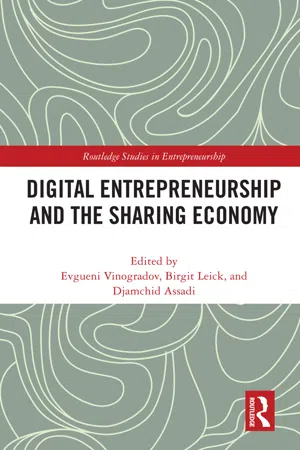Birgit Leick, Mehtap Aldogan Eklund, Susanne Gretzinger, and Anna Marie Dyhr Ulrich
Introduction
Parker et al. (2016, p. ix) write about entrepreneurs in the digital, platform-based age as follows: ‘The platform model underlies the success of many of today’s biggest fastest-growing, and most powerfully disruptive companies’. In fact, entrepreneurs in the sharing-economy are typically innovative business start-ups that rapidly grow into large, international players, some of them even from the earliest days of their inception (Kathan et al., 2015; Wang and Nicolau, 2017). The reasons behind their growth and internationalisation model are that the advent of a platform-based, and often global, online market with its digital infrastructure allows start-up entrepreneurs to perform entrepreneurial activities in a fast and smart way (Standing and Mattsson, 2018). However, such platform-based entrepreneurs in the sharing economy are simultaneously strongly dependent upon the existence of sufficient demand-side network effects (cf. Apte and Davis, 2019; Parker et al., 2016), which requires them to quickly spread their services or content among a steadily rising number of users. Since this enterprise development path exposes business start-ups in the platform-based sharing economy to a global hyper-competition in the online world, many do not survive and leave the market.
Altogether, this picture of entrepreneurship in the sharing economy is dominated by global players and national champions (such as the Swedish fintech Klarna) that develop a viable business model based upon the network effects enabling fast growth and expansion to global markets (Parker et al., 2016) and have sufficient resources from the national or global ecosystems. By contrast, the exploding literature on the sharing economy pays less attention to sharing-economy entrepreneurs with regional markets and the question of whether they can persist despite the importance of network effects on the global level. Regionally anchored sectors offer abundant opportunities for innovative start-ups to pitch their ideas by means of digital environments, for instance, in retail trade, the tourism and hospitality industries, farming and food economies, and the cultural and creative sector. For entrepreneurs in the sharing economy that operate in such rather regional than globalised sectors, several challenges emerge for the creation of a viable business model because they might find it harder to exploit network effects for their firm growth, compared to those platform-based sharing-economy ventures that grow and internationalise rapidly (Vadana et al., 2019; Wentrup and Ström, 2019).
By regional sharing-economy entrepreneurs, we define start-ups and early stage business ventures in the platform-based sharing economy that operate in a specific regional-national market area and are not internationalised from the outset. Regional sharing-economy entrepreneurs, thus, differ from their ‘born global’ and ‘born digital’ counterparts (Monaghan et al., 2020) in various respects: They supposedly have distinct characteristics of their business model with regard to the start-up stage, the opportunities for revenue generation and scalability (which both depend upon a growing number of users), and their overall viability as a new business venture in a global, and generally, hyper-competitive, market. Given the variety of business models existing with sharing-economy providers (Acquier et al., 2019; Assadi, 2020), we argue that there will be a diversity of business models and business development paths with regional sharing-economy entrepreneurs that will need to be explored to understand this phenomenon.
To date, there is no evidence available pointing to how the distinct business models of regional sharing-economy entrepreneurs might be described and if there exists at all a business model of such entrepreneurs with specific and common features. Hence, this chapter explores two central questions relating to this topic: (a) What are the entrepreneurial characteristics of applied business models in the platform-based sharing economy on the regional level? and (b) Which diversity of business models exists with such regional sharing-economy entrepreneurs? We present a concise literature review, which will be followed by an exploratory case study of the applied business models with four Norwegian start-up entrepreneurs in the sharing economy. The focus of this chapter is, thus, not to explain the technological side of digital entrepreneurship with the platform-based sharing economy, but illustrate the variety of business models on a regional scale and describe how these entrepreneurs, starting off regionally, are connected with national or global scales.
The rest of this chapter is organised as follows: The next section presents the related literature, followed by a section on the methodology and research design, including short profiles of the entrepreneurs. Subsequently, the empirical analysis is, first, presented and then discussed. The final section concludes the core ideas and findings and provides implications for practice and research.
